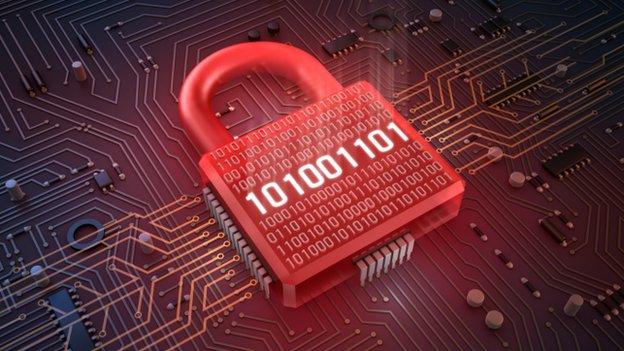Obama: Speech on perceived NSA abuses a turning point
- Published

President Barack Obama is scheduled to address the public on Friday regarding the NSA
It will be a critical moment in Barack Obama's presidency when he steps forward at the Department of Justice and reveals, external exactly how he intends to curb the perceived abuses by the US intelligence services.
The revelations, external by Edward Snowden that the National Security Agency (NSA) was collecting a huge amount of data from America's phone calls and internet use shocked many in the country.
Allies like Germany's Angela Merkel, external were infuriated that their phone calls were apparently tapped.
As government assurances about the scale and efficacy of the operations turned out to be untrue, external, distrust and suspicion grew.
'Wrong' balance
President Obama has spent a huge amount of time working out what to do. Over the last two weeks there has been a steady stream of visitors to the White House as he hears from senators, congressmen, CEOs of internet companies and civil rights groups.
One of those who have been consulted is Richard Clarke, external, former national co-ordinator for counter-terrorism and a member of the group set up by the president to advise him on how to respond to this crisis.
They made 46 recommendations, external and Mr Clarke says this is an important opportunity that won't come again - an opportunity to get the balance right.
"On the one hand, collect enough intelligence to make us safe from terrorist threats, Iranian nuclear proliferation, from drug cartels, the whole panoply of new transnational threats, yet at the same time see if you can do that in a way that preserves our traditional views of privacy and civil liberties," Mr Clarke says.
"The review group says you can do both. But to do both, we have to do more on transparency, on oversight and civil liberties protections. The balance is wrong today."
"In what way?" I ask him.
"We have this entire process which is overly secretive, protecting information from the pubic which wouldn't hurt anyone if it was revealed," he added. "So much of the distrust of government comes from the lack of transparency."
The group recommends the NSA should not be allowed to collect all the information it currently holds.
"What we suggested is that it does stop, that the government should not be taking in all the telephone data over every phone call made in the US every day," Mr Clarke said.
"One of our recommendations was the government ought not to be the repository for that information and the government should not be able to look at it without going to a judge first."
I put it to him that requiring the phone and internet companies to keep the information is rather like keeping something in a desk in the next office, rather than in your own drawer - it doesn't really make a lot of difference.
"Right now it is extremely easy for the government to look at it. It doesn't need permission - it makes that decision within NSA. What we are saying is 'No'. The decision to look at it should require considerable review, including that of an independent judge," he explained.
A 'trade-off'

Intelligence leaker Edward Snowden is a former NSA contractor
Among those who've trooped into the White House are the chiefs of the nation's 17 intelligence agencies, external.
Many of them will be warning the president not to go too far.
Prof John McLaughlin, external is a former deputy director of the CIA. He says the president will be conservative in his proposals.
"The danger here is that we could take steps which, if not carefully carried out, could limit the flexibility, agility and speed with which we can process intelligence material in order to disrupt terrorist plots and activity," he said. "That's the danger."
He admits there's public pressure for change.
"There's a trade-off here between acceptance of risk and protection of privacy," Mr McLaughlin said. "If people are willing to accept somewhat more risk, which they may be, then privacy can be totally protected."
"Of course I am not one who thinks that privacy is being invaded here," he added. "If you look at this large collection of data - a bulk collection - the NSA has dipped into this only a couple of hundred times in a given year."
He makes the point that key allies, like the British, will trust the US less because of these revelations. Some from the UK have other concerns.
International reforms
The former Shadow Home Secretary, MP David Davis, external, has been in Washington recently, digging with some delight into the revelations.
A supporter of civil liberties group Big Brother Watch, external, he argues the British government will have to bring in sweeping changes.
When I spoke to him outside the Capitol he told me, "We cannot do things that the Americans won't do - we can't let our standards be lower than them.
"There are big implications for GCHQ - they receive about $100m (£61m) a year from the NSA to help the NSA do the things they are now being stopped from doing," he added. "There are big commercial considerations - the Silicon Valley companies reckon this has cost them $35bn - 12% of our economy is internet-based, and we don't want to become the pariah of the internet world. There are a whole series of implications."
The leaks go on - the latest detail, external has just been made public by Edward Snowden, perhaps to give a little further push to the process.
Jesselyn Raddack, external of the Government Accountability Project is Edward Snowden's lawyer and spoke to him earlier this week. She says his aim was to provoke this moment.
"I think Edward Snowden's biggest fear was that he would risk everything to make these disclosures and nothing would happen, so he's gratified that reform is taking place here and all over the world," she said.
Secrecy required
All of this was being done in secret but now the cat's out of the bag.
Finally Congress can talk about these programmes, whereas before they were muzzled. Finally the executive branch is being held accountable for what many regard as illegal, unconstitutional and over-reaching surveillance.

The revelations have drawn sharp condemnation from civil liberties groups
But John McLaughlin says that is exactly the wrong way to make vital decisions, when al-Qaeda has expanded its area of operations and is a bigger threat than before.
"It is rare that we or any other country makes decisions about foreign policy based on public opinion," he said. "Here's a case where public opinion - opinion that comes from the actions of an individual who leaked in an unauthorised way a massive amount of material - public opinion is driving intelligence policy."
I ask him if that is really so wrong in a democracy?
"A democratic system has to be comfortable with intelligence but the idea that you shape your intelligence policy or specific operational decisions based on a public debate is, I think, not a wise way to make operational decisions about intelligence," he said.
"The public is certainly entitled to know our government intercepts communications, the public is entitled to know the government recruits human agents abroad, our public is entitled to know our government takes photographs from space, but in order to preserve the effectiveness of those programmes they do require some secrecy."
As ever, insiders say the president has mastered all the complex technical details in play and thought long and hard about which way to go. But it is not really a technical question.
He must be acutely aware that if something dreadful happens in the future, any tightening of the rules will be put under intense scrutiny, and blamed by some.
But the public disquiet and the shock of allies means he has to act.
As so often, his liberal instincts may be at war with his perceived duty as commander in chief - and he may be doomed to disappoint many on both sides of the debate.
- Published17 January 2014

- Published15 January 2014

- Published10 January 2014
